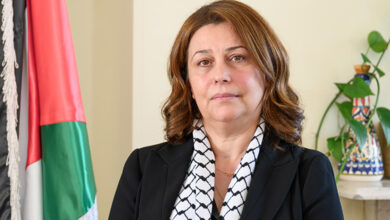“Building a better health service for Ireland”


Minister for Health Simon Harris TD speaks with eolas on the most pressing priorities currently impacting his portfolio and outlines a vision for the future of Irish healthcare.
“What is unique about their report – the Sláintecare Report – is that it enjoys support from across the political spectrum. That political consensus is a great achievement, and one that I am committed to ensuring isn’t wasted.”
Against a backdrop of recent projections indicating a significant potential increase in the demands placed upon Irish healthcare; how does the Department plan to respond and what is being done to mitigate for the challenges of healthcare professional recruitment and retention?
Recruiting and retaining medical staff is key to the delivery of our health services and is priority for me as Minister.
Healthcare professionals are the backbone of our system and during my time as Minister, travelling around the country, I have continuously witnessed the invaluable work that they do across the health service.
I’m pleased to say that the level of recruitment in the health services is continually increasing. At the end of November 2017, health services’ employment stood at 110,470 whole-time equivalent posts (WTEs). This is a 3,661 WTE increase in the last 12 months and compares to a level of just under 100,000 at the beginning of 2015.
Of course, I would accept that we do face challenges in relation to recruitment and retention and that is why we are taking a number to steps to respond to those challenges.
A National Strategic Framework for Health and Social Care Workforce Planning has been developed by a Cross-Sectoral Group led by my Department, which will support the recruitment and retention of the right mix of workers across the health and social care system to meet planned and projected service need.
There is a recruitment and retention agreement in place for an additional 1,224 nursing and midwifery posts. In terms of consultants, revised pay scales were agreed for new entrant consultants in January 2015 and the report, Towards Successful Consultant Recruitment Appointment and Retention, is being implemented in the HSE. The number of non-consultant hospital doctors (NCHDs) has risen and the implementation of the recommendations of The Strategic Review of Medical Training and Career Structure Working Group (MacCraith Report) are continuing to have an impact.
Importantly the Public Sector Pay Commission is now working on Phase 2 of its work, focusing exclusively on health sector grades initially, encompassing nursing, consultants and NCHDs. It will make its final report to the Minister for Public Expenditure and Reform by the end of 2018.
What is the current status of Sláintecare as the proposed 10-year plan for health reform?
One of the first things this Government did was to establish the all-party Oireachtas Committee on the Future of Healthcare. Chaired by Deputy Róisín Shortall, this group worked together for almost a year to come up with a plan for the future of the health service. What is unique about their report – the Sláintecare Report – is that it enjoys support from across the political spectrum. That political consensus is a great achievement, and one that I am committed to ensuring isn’t wasted.
The Government has affirmed its commitment to implementing a significant programme of reform as outlined in the Slaintecare report and I expect to present a response to the report along with a proposed implementation plan to Government shortly. This will set out our ambitions for the next decade and concrete plans for the immediate years ahead.
This detailed work will be overseen by a new Sláintecare Programme Office. The recruitment process for an Executive Director for this Office has commenced and is to be completed by April 2018.
I have already taken action on a number of recommendations in the report. An independent impact assessment of removing private practice from public hospitals is underway and will report later this year. Legislation to introduce a Governing Board for the HSE is being drafted and this will strengthen performance and accountability arrangements. I have also announced a consultation process on alignment of hospitals groups and community health organisations. These actions are important first steps in a long-term reform process, and demonstrate the Government’s commitment to driving real change and reform in the coming years.
It’s also important to point out that funding for new initiatives in Budget 2018 were closely aligned with proposals in Sláintecare. This allocation of €143 million shows the commitment of the Government to supporting key actions necessary for reform.
How can the decisive shift towards primary care be made in the delivery of healthcare services?
Making that decisive shift to primary care a reality is at the core of my plans, and this Government’s plans, for the health service. We are committed to delivering more non-acute care within the primary care sector, so that better care, close to home, can be provided for communities around the country.
The expansion of the range of services and capacity available within primary and community care is one of my key priorities, as it can and will help to keep people well, and minimise, as far as possible, the number of patients admitted to hospitals in the first place.
The provision of a €25 million Primary Care Fund from Budget 2018 reflects my commitment to ensuring that the primary care sector, now and in the future, is equipped to deliver modern, responsive and effective healthcare provision for all in our society.

We have invested significantly in our primary care infrastructure providing modern well equipped primary care centres, which allow our primary care teams and GPs to be located together, enabling the delivery of a wider a range of integrated primary care services. There are currently 110 primary care centres operational with a further 18 expected to become operational throughout 2018. There will be a continued focus on advancing those 60 locations, which are under construction, or at various planning stages.
Government is implementing a number of key measures that are delivering a real impact in terms of shifting care out of the acute hospital system. One such measure is the development of the Community Intervention Team Service, a successful hospital avoidance measure, which received additional funding in Budget 2018 for further expansion. This is having a very real impact. The Home IV antibiotics programme (OPAT) saved 25,723 bed days for referrals made between January and November 2017. Another vitally important measure is that of access to diagnostics for GPs in the community, which will alleviate pressures on the hospital system to provide such services. That’s why we have put in place enhanced community diagnostic programmes for ultrasound and x-ray.
I want to acknowledge the important role that GPs play in our health service, and my strong commitment to the development of a new GP contract. The aim is to develop a contract which has a population health focus, providing in particular for health promotion and disease prevention and for the structured on-going care of chronic conditions.
I can tell you that the shift of healthcare delivery towards primary care remains a key priority for the Government and, indeed, is one of the key features of Sláintecare.
How does your Department intend to address resourcing demands to reduce higher waiting times and improve the care provided in areas of socio-economic disadvantage?
This Government is reinvesting in our health service with a focus on improving access, building capacity, investing in infrastructure, advancing a new GP contract and delivering a transformational 10-year reform programme based on the all-party Sláintecare report.
Our commitment to building a better health service is demonstrated by increasing health budgets, with an increase of €1.7 billion since 2013. Since then our health service staff has increased by almost 10,000, including 2,000 additional nurses and over 1,000 additional hospital doctors.
We have also been able to extend free GP care to more of the population including over 70s and children under six, extend full medical card coverage to children with disabilities, and reduce the cost of medicines by lowering the prescription charge and reducing the monthly threshold for the Drugs Payment Scheme.
I want to continue to provide more help to families, and continue to increase bed capacity and staff.
Irish people report good experiences of our health service, as shown in the recent National Patient Experience Survey, but a key challenge remains gaining access to those services.
The progress achieved on waiting lists in 2017 shows us what is possible in 2018 when the allocation to the National Treatment Purchase Fund (NTPF) almost trebles. While the outpatient waiting list remains a challenge which must be addressed in 2018, there has been significant progress on the active waiting list for procedures on an inpatient or day case basis. The overall number on this list hit a high of 86,000 in July 2017 before waiting list plans began to impact which led to an overall reduction of 4,500 by year end. The number of patients on this list waiting for more than nine months was reduced by more than 5,000 between July and December. The number of patients waiting for cataract operations was reduced by almost 2,000 and the number waiting over 15 months reduced from almost 1,600 to just over 300. At the end of the year more than half of cataract patients are waiting less than six months and 72 per cent are waiting less than nine months. Overall, at the end of the year, 57 per cent of patients wait less than six months and 72 per cent wait less than nine months. We will see more progress on the overall list and on long waiting times in 2018.
The Government wants to break the cycle of overcrowding in hospitals and has already opened new emergency departments (EDs) in Limerick and Kilkenny and has plans for new EDs in Drogheda, Galway and Beaumont Hospital.
In the face of increased demand, we continue working to improve performance. The reality is we need more beds to reduce the unacceptable number of patients who are still ending up on trolleys. This winter we have already opened an additional 170 beds and further beds will open throughout 2018. In addition, €25 million of the increased budget will be spent on providing additional home care packages and transitional care beds to support the discharging of patients from hospitals to their home or community settings, as clinically appropriate.
The capacity report, which I recently published, will inform our longer-term plans and it is feeding into the forthcoming National Development Plan.
What is your vision for Irish healthcare going forward, with particular reference to reproductive health?
I am committed to building a better health service for Ireland, with a focus on improving access, building capacity, investing in infrastructure, advancing a new GP contract and delivering the Sláintecare reforms.
In terms of reproductive health, Ireland’s first National Maternity Strategy, Creating a Better Future Together, provides a clear vision and direction as to how Irish maternity services will be developed, improved and made safer, over the coming years. It will ensure that women are front and centre in all decisions about their care. Implementation of the Strategy will ensure that every woman will be able to access the right level of care, from the right professional, at the right time and in the right place, based on her needs. In line with the Strategy, the National Women and Infants’ Health Programme (NWIHP) was established in January 2017 to lead the management, organisation and delivery of maternity, benign gynaecology and neonatal services, strengthening such services by bringing together work that is currently undertaken across primary, community and acute care.
“I believe that as people reflect on the current situation in Ireland, where women are forced abroad to have a termination, where women are purchasing abortion pills illegally online and where women in extremely difficult situations are left isolated and neglected that the Irish people will vote to repeal the 8th amendment.”
I am delighted that we have been able to provide funding to the Programme to roll out the Strategy in line with the Programme’s priorities for 2018. These include improving quality and safety, developing community midwife teams and increasing access to anomaly scans. Such developments will facilitate the on-going implementation of the new model of care and deliver tangible improvements for the 80,000 families who access maternity care all around the country each year.
Officials in my Department are engaging with the Office of the Attorney General in relation to the process of drafting a Bill on assisted human reproduction (AHR) The General Scheme of this Bill has been submitted to the Joint Oireachtas Committee on Health for review, which began on 17 January 2018.
I have stressed the importance of this legislation and implementing a model of care for AHR, to promote and ensure the health and safety of parents, and children born as a result of AHR treatment, as well as other parties who may be involved such as donors and surrogates.
[During the final week in February] the Cabinet gave formal approval for the draft General Scheme of the Bill which will form the basis for the referendum on Article 40.3.3 of the Constitution to be held in late May this year. For the first time since 1983 the Irish people are to have their say on the substantive issue of the 8th Amendment and whether it should be removed from our Constitution. It is important that we are clear that if the people of Ireland do not repeal article 40.3.3 we cannot legislate for fatal foetal abnormality, rape, incest or women’s health. We need to change the status quo; I believe that as people reflect on the current situation in Ireland, where women are forced abroad to have a termination, where women are purchasing abortion pills illegally online and where women in extremely difficult situations are left isolated and neglected, that the Irish people will vote to repeal the 8th amendment.





